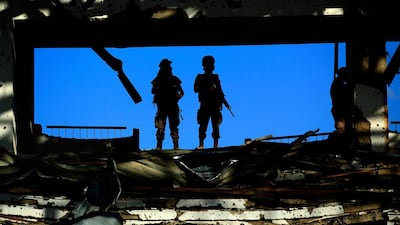As momentum builds for new UN-sponsored peace talks, a new report argues that stopping the fighting in Yemen is the only way to prevent a historic famine.
The report by International Crisis Group, a conflict monitoring NGO headquartered in Brussels, published on Wednesday argues that Houthi rebels in Hodeidah face a stark decision between withdrawing or fighting a battle that would cause a humanitarian catastrophe.
“They have a clear choice between agreeing to a negotiated exit from the port and joining a battle that would prove devastating to millions of people in territories currently under their control,” the report states.
After three years of fighting between Houthi rebels and pro-government forces backed by the Arab coalition, 8 million Yemenis are currently affected by severe food shortages. UN officials say that 14 million people, or half the population, are at risk of famine. More than 80,000 children have died of starvation in the past three years, according to Save the Children.
Attention is now squarely focused on the critical port city of Hodeidah – a lifeline for two-thirds of Yemen’s population. The Arab coalition says removing the Houthi rebels who have held the port since 2015 either by force or a negotiated settlement is critical to bring an end to the war and preventing a humanitarian catastrophe.
The ICG report points to a diplomatic solution as the only way to prevent a widespread famine.
Military operations are currently paused while a diplomatic solution to the war is pursued. UN Envoy to Yemen Martin Griffiths arrived in Sanaa on Wednesday to lay the groundwork for peace talks in Sweden.
The last talks attempted in Geneva in September failed after the Houthi delegation failed to attend.
The ICG carried out fieldwork in Hodeidah and on three main frontlines in September and October, interviewing both Houthi rebels and pro-government forces.
______________
Read more:
UAE and Saudi pledge $500m to stem famine in Yemen
UN draft resolution calls for Yemen truce, two weeks to unblock aid
More than 80,000 children died of hunger in Yemen since 2015, charity says
______________
The report says that, if pushed by a full-scale military assault on the city, the Houthis would likely dig in for an extended battle that would be devastating to the civilian population.
“A drive for Hodeidah will make them only more suspicious and induce them to dig in rather than sue for a way out,” the report argues. “They have been preparing for a Hodeidah battle since late 2016 and have spent much of this year constructing defences, including barricades, trenches and, reportedly, a network of tunnels under the city.”
The ICG found that the level of preparation as well as the Houthi's zeal to keep hold of the city could pose a greater challenge for the coalition backed forces than they may anticipate.
A concern raised by some analysts is that the Houthi’s may mine or destroy key port infrastructure during a battle to prevent further shipments of aid entering the facility rather than allow the coalition to retake it. Coalition and UN aid shipments continue to dock at the site although the number has decreased in recent weeks. There are also thousands of civilians who remain trapped in the city.
The Arab coalition says that one option to mitigate the humanitarian impact of fighting in Hodeidah would be to transport humanitarian supplies and food through alternative routes. However, the report says it is "far from clear whether the current humanitarian programme can be scaled up any further."
Instead, the report calls for the UN Security Council to urgently pass the resolution under consideration calling for a cessation of hostilities in and around Hodeidah.
International stakeholders should facilitate the transfer of the port to the UN, the ICG argues. The Arab coalition says it would be amenable to this proposal but so far the Houthi’s have not consented to withdraw from Hodeidah and handover control of the port.
The report concludes by arguing that the international community, the Arab coalition and the Houthis now face an obvious choice: “Allow the momentum to continue toward a final battle for Hodeidah and become complicit in a man-made famine the UN says would be the worst in a generation, or act to prevent it.”

